
Tales of the Tape from Bygone Days
September 10, 2014
By Rob Kaminski
MHSAA benchmarks editor
How’s this for a new reality/espionage TV series? Participants have just hours to exchange valuable video to counter-intelligence representatives at random drop points along state highways, then return to home base, study the footage and devise an action plan that same day.
Oh, and there are no cell phones or any other form of portable communication should plans go awry en route.
For longtime Escanaba High School football coach Dan Flynn, it’d be like watching reruns of his days as an assistant coach for the Eskymos. As one of the largest schools in the Upper Peninsula, Escanaba’s road through the MHSAA Playoffs almost always meant facing opponents from below the bridge, which made film exchange a challenge to say the least.
“I’ve logged thousands of miles, maybe more than anyone ever, exchanging film, tapes and DVDs with our opponents during the MHSAA Playoffs,” Flynn said.
“Being in Region 1 geographically, we knew we’d travel,” Flynn added. “And you couldn’t afford to just look at anyone and everyone that you might play. You had to do your homework to narrow down possible opponents if you wanted to go and scout.”
Today, with the MHSAA publishing Football Playoff Points on a weekly basis following Week 4, much of the guesswork as to potential first-round opponents has disappeared.
Additionally, most schools upload game footage to the web within 24 hours following each contest. On Selection Sunday, within minutes after a school’s Pre-District foe is announced, a coaching staff and players can be watching video of their opponent.
“We’d started calling coaches or they’d call me in Week 8 or 9, looking at possible matchups and also planning a place to meet to exchange film,” Flynn said.
Plans had to be firm and communications had to be clear, because once hitting the road, there was no way to contact one another.
“This was before cell phones,” Flynn explained. “I had one of first cell phones, which actually was an old bag phone. I’d accumulate outrageous rates for roaming charges going tower to tower.”
Old-school video exchange might be a thing of the past, but a generation of high school football coaches will never forget gas stations, fast-food joints and 24-hour stores nestled off exit ramps across Michigan.
“On that Sunday night, I’d get in the car, and typically drive to Gaylord, or maybe Grayling. In Gaylord it would be the McDonald’s. In Grayling, it’d be Glen’s Food Market. You’d try to arrange to meet at a place that was open 24 hours,” Flynn recalled. “I always got in the car understanding the meeting would be below the (Mackinac) Bridge. Sometimes we’d get lucky and the meeting place would be the Shell gas station just below the bridge on the Mackinaw City side.”
The 200-mile drive to Gaylord routinely took four hours. The further Escanaba advanced in the playoffs, the more times Flynn wore down the tread on his tires. He specifically recalls a hectic weekend in 1979, when Escanaba traveled to Lansing Sexton and defeated Livonia Stevenson in the MHSAA Semifinals to earn a berth in the Finals the following weekend vs. Detroit Catholic Central. Part of the reward for Flynn was another trip to McDonald’s.
“We came from behind in that Semifinal, and we were thrilled that we were going to the Finals. We got back home late Saturday night, then I got in the car the next morning to meet the Catholic Central coaches at 1 p.m.,” Flynn said.
“Coach (head coach Jerry) Cvengros had a meeting set for 5 or 6 that night. I made it back in time, but our guys were still feeling good about the win, so I suggested we hold off a day before showing them the CC film (16 mm film, by the way). Those guys were pretty good.”
Indeed they were, winning the Class A title the following weekend. The Eskymos, however, would return to the Final in 1981, winning the crown, 16-6 over Fraser, as Flynn no doubt logged more miles in preparation.
The most pressing concern today might be quality of the online video, lighting at the fields, or angle of the camera.
Back in the day, just getting a tape felt like victory.
“One year, I traveled all the way to the southeast part of the state, and the opposing coach simply wouldn’t exchange,” said Flynn, explaining that playoff film exchange at the time was only a recommendation, not a regulation. “I learned later that the coach had video of us from a friend who lived in Escanaba. I left on Saturday morning and came back Sunday night. We did eventually get some film later in the week. We lost by two points, but as coaches we didn’t make it a big vendetta and were up front with our kids.”
The MHSAA Representative Council, which included Flynn at the time, upgraded film exchange from a recommendation to a playoff policy in 1990, when schools were required to supply one another with the two most recent game films.
Even so, and as 16 mm film evolved to VHS tapes and then DVDs, coaching delegates still had to make itineraries for October and November weekends. Sometimes twice in the same weekend.
“Even with advancements in technology as we progressed from DVDs to digital, you still need people to operate the devices,” Flynn said. “I met another coach at the Shell station at the Bridge, but he said our software wasn’t compatible with theirs. I drove back the next day, pushed a button, and it worked. I drove all that way to push a button; 16 mm film would have been better.”
Today’s coaches might be a bit more well-versed in technology than those of Flynn’s era, and it’s a good thing. They likely need MapQuest and a GPS to traverse the regions in Northern Michigan that Flynn and his cohorts knew like the back of their hands.
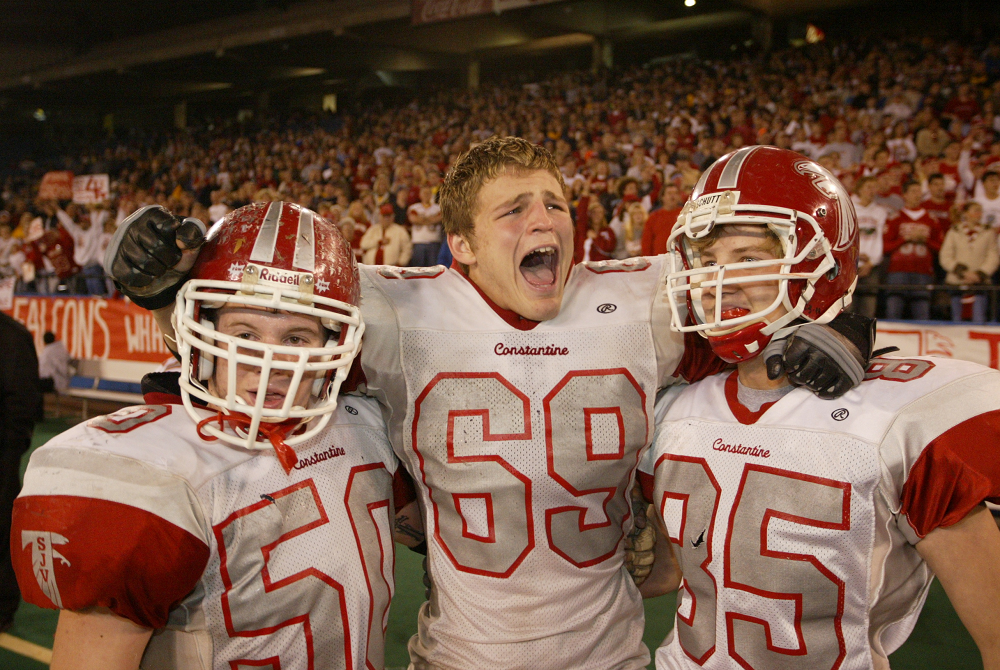
Constantine Celebrates 100th Season, Renowned for Continuity & Signature Wing-T
By
Scott Hassinger
Special for MHSAA.com
September 6, 2023
CONSTANTINE – Bennett Vandenberg and Cohen McGee are just like any other high school football players.
 Both Constantine seniors have high aspirations of winning a fifth-straight Southwestern Athletic Conference Lakeshore title and reaching the postseason.
Both Constantine seniors have high aspirations of winning a fifth-straight Southwestern Athletic Conference Lakeshore title and reaching the postseason.
But Vandenberg and McGee, along with their Falcons teammates, will be celebrating more than victories and a potential playoff appearance this fall.
Constantine, a community located in southern St. Joseph County, is observing the 100th season of the school's football program.
The Falcons (1-1) will commemorate the occasion Saturday, Oct. 7, with a home game against SAC Lakeshore foe Kalamazoo United. Kickoff time from Sweetland Stadium is 1 p.m. The game will be followed by a community luncheon and program in the high school at which time past coaches, players and the program's biggest accomplishments will be recognized and celebrated.
Vandenberg, a starting fullback/tight end and outside linebacker, and McGee, an offensive lineman and linebacker, are both looking forward to the rest of the season and continuing Constantine's strong tradition on the gridiron.
"We have a huge football tradition here at Constantine. This year we're celebrating the 100th year, and we have some of the oldest living players coming back to help celebrate after that game with United,” said Vandenberg, a three-year starter and Finals placer his junior year in wrestling and track & field. “Our community is all about football. We know we have to go out there and represent our school and community the right way."
McGee is following in the footsteps of his older brother Carter.
"There are lots of things that people who follow Constantine football don't see, like the hours of dedication and work we put in during the offseason. That's where we make our strides and become better as a program," McGee said.
The football stadium at Constantine is named after Dr. George Sweetland, a physician in the community, who donated money for a football stadium to be built with a hill completely circling the facility.
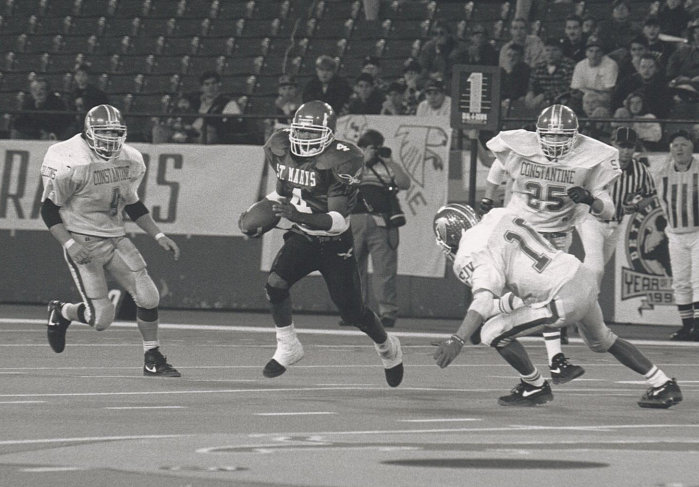 Sweetland, who moved to Constantine in 1916 to take over his brother's medical practice after the latter was killed in a car crash, reportedly allowed patients to work off their medical bills by helping with the stadium's construction.
Sweetland, who moved to Constantine in 1916 to take over his brother's medical practice after the latter was killed in a car crash, reportedly allowed patients to work off their medical bills by helping with the stadium's construction.
Constantine, which played its first football game in 1924 and finished as county champs at 4-2 under coach Lew Lake, sports an all-time record of 481 wins and 221 losses with 11 ties. During that span, the Falcons have enjoyed 11 unbeaten seasons, including Robert Finlay's 1937 squad that went 8-0 and was unscored upon.
Coaching longevity is one of the biggest factors allowing Constantine to be as successful as it has been, especially during the program's modern era. The Falcons have had just four head coaches since 1964.
Mike Messner, a three-sport athlete and 1965 Constantine graduate, later served as the school's athletic director from 1992-2016.
Messner pointed to Meredith 'Spud' Huston, Constantine's football coach from 1958-1961, as one of the first individuals influential in setting the wheels in motion for the program's future success.
Huston guided the Falcons to their first league title in 1961.
Constantine's four winningest coaches – Dave Horn, Tim Baker, Ken Rimer and Shawn Griffith – are all honorary members of the Michigan High School Football Coaches Association's Hall of Fame.
Horn, who died earlier this summer, served two stints as Constantine's head coach from 1964-1981 and 1987-1989 while compiling a 116-65-4 record.
Baker (129-30) coached Constantine for 15 seasons and guided the Falcons to a record of 129-30. Under Baker, the Falcons were Division 6 champs in 2004 and Finals runners-up in 1994 (Class CC) and 2002 (Division 5).
"Dave (Horn) was a genuinely great person who coached 21 years. He could get upset at you on the field, but he was a very kind, storyteller and a thoughtful guy who really cared about others," Messner said.
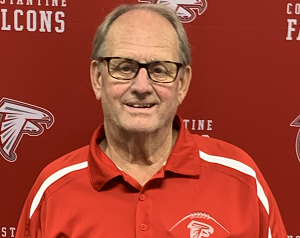 "In the modern coaching era, Tim (Baker) really believed in lifting weights, making kids stronger and developing kids into good football players. He was diligent, hardworking and put a lot of time into the program while missing a lot of family functions. He concentrated on doing the best job he could. Ken (Rimer) was right there in the same mode as Tim. When they started coaching together, they wanted a program that kids at Constantine could be proud of. Things started really happening, and ever since then the program has been strong. We have coaches who want Constantine to be successful on the field."
"In the modern coaching era, Tim (Baker) really believed in lifting weights, making kids stronger and developing kids into good football players. He was diligent, hardworking and put a lot of time into the program while missing a lot of family functions. He concentrated on doing the best job he could. Ken (Rimer) was right there in the same mode as Tim. When they started coaching together, they wanted a program that kids at Constantine could be proud of. Things started really happening, and ever since then the program has been strong. We have coaches who want Constantine to be successful on the field."
Rimer spent 28 years as an assistant coach under Baker and current head coach Shawn Griffith. Constantine compiled a win-loss mark of 242-70 with Rimer as an assistant.
Griffith, who took over as Constantine's head coach in 2005, is the Falcons’ all-time winningest coach at 156-53. Under Griffith's tutelage, the Falcons have made 17 playoff appearances, with back-to-back Division 6 runners-up finishes in 2011 and 2012.
"The history of Constantine football kind've coincides with everything else here in the community. This is my 32nd year overall as a coach in this program. But I also have several memories from when I was in high school at Mendon as a player going up against Constantine," Griffith said.
"When you talk about any community our size, you immediately look at family names. We have another Stears (Lucas) on this year's team. Mike (Messner) told me there have been over 20 from the Stears family that have worn the Falcon uniform. It doesn't stop there. I look at the number of kids we have in the locker room this year, and I realize that I've coached many of their brothers, fathers and uncles. We look at the program as one big family. This program has helped to raise a lot of young men in the area these last few years. The community has been extremely supportive of the program as well."
Constantine won 19 league championships as a member of the St. Joseph Valley League from 1952-2007. That league consisted of Constantine, White Pigeon, Schoolcraft, Centreville, Colon, Climax-Scotts, Burr Oak and Mendon. Bronson and Battle Creek St. Philip became members later after Climax-Scotts and Burr Oak left to join the Southern Central Athletic Association. Eventually, the SJV disbanded due to conference realignment and declining enrollment among its smaller schools.
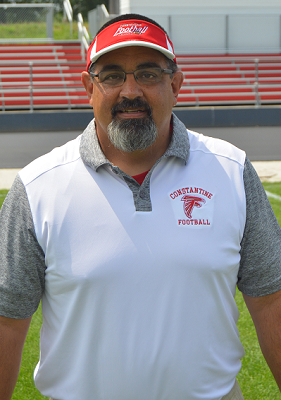 At one time, Constantine played in one of the longest-running rivalries in state football history. The Falcons and archrival White Pigeon began playing one another in 1924 and Constantine held a 47-35-6 in the rivalry, with wins in the final 17 meetings before the series ended after the 2007 season.
At one time, Constantine played in one of the longest-running rivalries in state football history. The Falcons and archrival White Pigeon began playing one another in 1924 and Constantine held a 47-35-6 in the rivalry, with wins in the final 17 meetings before the series ended after the 2007 season.
Messner recalls the 1981 meeting between White Pigeon and Constantine as one of the most memorable. The game was played at the Sweetland Stadium in Constantine, and there were more than 5,000 people in attendance.
"White Pigeon came into that game unscored upon and ranked No. 1 in the state. We were undefeated, but nobody was saying anything about us, but they were really talking (White Pigeon) up," Messner said. "(White Pigeon) had brought over 1,000 balloons with them and hid them behind the bleachers. They were going to launch them every time they scored. They never scored, and we beat them 21-0. It was such a sad moment for both schools when they had to stop playing one another in football."
After the SJV dissolved, Constantine and Schoolcraft became members of the Kalamazoo Valley Athletic Association from 2008-2014 before leaving to join the Southwestern Athletic Conference for the 2015 season. Constantine begins its ninth season competing in the SAC Lakeshore against the likes of Watervliet, Allegan, Kalamazoo United, South Haven and Parchment.
Messner also lists several playoff games as big moments in Constantine's football history.
"Our first playoff team (1991) was a big year, and our first state finals appearance (1994) was another," Messner added.
Constantine lost to Orchard Lake St. Mary's (35-7) in the 1994 Class CC Final, but knocked off heavily-favored Fennville (50-0) in their Pre-Regional and Whittemore-Prescott (54-6) in a Semifinal to get there.
"Both teams were considerably bigger than us up front on the line. Fennville had a really good quarterback (Frank Alfieri) and Whittemore-Prescott had a great tailback (Tom 'Touchdown' Tyson) that our much smaller guys managed to shut down," Messner said. "Then there was a 13-7 win we had in the 2002 Regional Finals over heavily-favored Muskegon Oakridge."
But perhaps the 2004 Semifinal deemed 'The Miracle in Marshall' will go down as the most memorable game in Constantine history. In that contest, Constantine trailed Monroe St. Mary Catholic Central 27-14 with a little more than six and a half minutes to go in the fourth quarter.
The Falcons scored twice during those last few minutes, including a last-second 32-yard TD pass from Aaron Baker to Sean Wolf caught in the end zone that tied the game at 27-27 with one second left. Jordan Williams booted the PAT as time expired, giving the Falcons a 28-27 win.
Constantine went on to defeat Suttons Bay 34-13 in the Division 6 Final the following week.
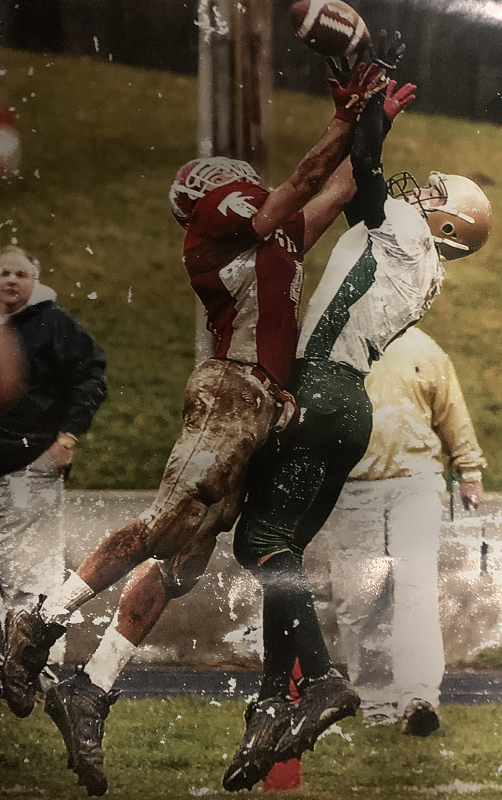 From 1991-2015, Constantine attained at least seven wins for 25 consecutive years, which is a state record. The Falcons made 18 consecutive playoff appearances from 1999-2016 before suffering their most recent losing season in 2017, when they finished 3-6.
From 1991-2015, Constantine attained at least seven wins for 25 consecutive years, which is a state record. The Falcons made 18 consecutive playoff appearances from 1999-2016 before suffering their most recent losing season in 2017, when they finished 3-6.
Constantine's overall playoff record stands at 49-25 with 26 total appearances.
It was Griffith, who played his high school football at Mendon for Class D championship-winning coach Roger Smith and his then-assistant John Schwartz (who would later lead the Hornets to 10 more Finals titles) who convinced Baker the Falcons should transition from the I-Formation to the Wing-T offense.
After much discussion and argument among the coaching staff, Baker reluctantly agreed to Griffith's idea.
"I joined the coaching staff in 1992 as offensive coordinator. As a coaching staff, we really came into our own and made our first run to the Finals in 1994. In the late ’90s we had some really good teams, but still didn't quite have a real identity. During that time we ran into some really good Wing-T football teams," Griffith said.
"We started noticing that we had a real hard time stopping these teams that ran the Wing-T like Muskegon Orchard View, Hopkins and Battle Creek Pennfield. So I came to Tim (Baker) after the 2001 season with the idea of changing the offense. We knew we had a tremendous group of running backs coming up through the program for the next seven or eight years. I approached him about running the Wing-T. He wasn't real receptive at first about running it. But after sitting down with other Wing-T coaches like John Shilito (Muskegon Orchard View) and Irv Sigler (Belding), he agreed to give it a try."
Constantine began running the Wing-T at the start of the 2002 season.
"Once you get known for running an offense like this, it kind've becomes your niche. I get emails from people all over the United States wanting me to come teach them this offense at camps. Here at Constantine, we've been fortunate to rack up quite a few wins since we installed this offense. Our kids can really talk the Wing-T game, and we didn't really have that before when we were running our I-formation and single-back stuff," Griffith said.
"The blocking schemes have become ingrained in our kids. They do a great job of knowing where they are supposed to be and who they are supposed to block. Another thing I really like about the Wing-T is it's a lineman's offense. Our linemen get a lot of credit, which they deserve. There is a certain toughness to this offense as well. It's allowed us to use kids who might be smaller and less athletic, but still allows us to be successful because they have developed a certain toughness."
Griffith credits a lot of that toughness to his players who compete on the Falcons' wrestling team during the winter sports season. Constantine’s wrestling program also has enjoyed a long run of success, including a Class C-D title in 1993 and Division 3 runner-up finish in 2002. The Falcons have won Team Regional titles three straight seasons.
 Scott Hassinger is a contributing sportswriter for Leader Publications and previously served as the sports editor for the Three Rivers Commercial-News from 1994-2022. He can be reached at [email protected] with story ideas for Berrien, Cass, St. Joseph and Branch counties.
Scott Hassinger is a contributing sportswriter for Leader Publications and previously served as the sports editor for the Three Rivers Commercial-News from 1994-2022. He can be reached at [email protected] with story ideas for Berrien, Cass, St. Joseph and Branch counties.
PHOTOS (Top) Constantine players celebrate near the end of their 2004 championship win at Pontiac Silverdome. (2) A trio of Constantine defenders pursue Orchard Lake St. Mary’s Phil Martin (4) during the 1994 Class CC Final. (3) Longtime Constantine athletic director Mike Messner. (4) Current Constantine head varsity coach Shawn Griffith. (5) The 2004 “Miracle in Marshall” remains one of the most memorable games in Constantine football history. (Finals photos from MHSAA archive. “Miracle in Marshall” photo by Dick Carter. Messner and Griffith photos gathered by Scott Hassinger.)

